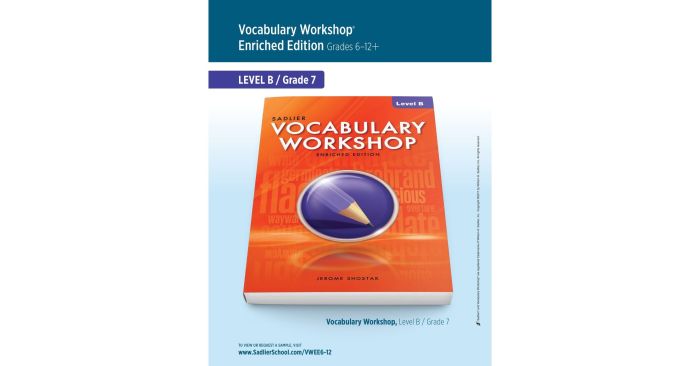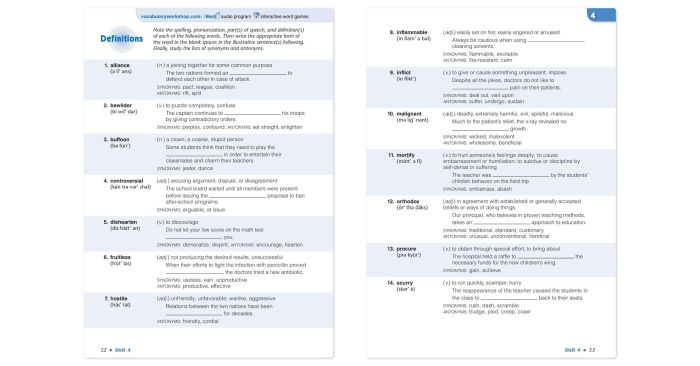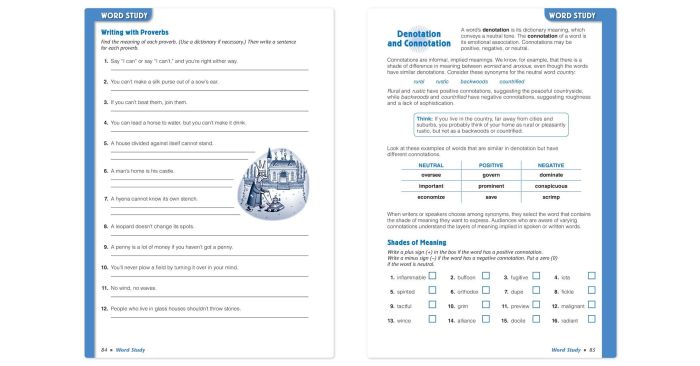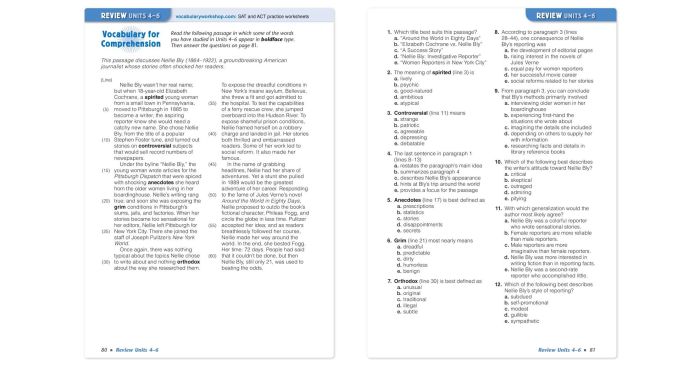Embark on a captivating linguistic journey with Vocabulary Workshop Level B Unit 12, where you will delve into the depths of new words, explore their intricate meanings, and master their usage. Prepare to broaden your vocabulary and enhance your communication skills to new heights.
This unit promises an immersive experience, equipping you with the tools to dissect words, uncover their etymological origins, and unlock their contextual significance. Engage in interactive activities and visual representations that will transform vocabulary learning into an engaging and memorable adventure.
Vocabulary Expansion

In Unit 12, we will be expanding our vocabulary by learning several new words. These words are commonly used in various contexts, and understanding their meanings and usage will significantly enhance your comprehension and communication skills.
Here is a list of new words introduced in this unit:
- Exquisite: extremely beautiful or pleasing to the senses.
- Serene: calm, peaceful, and untroubled.
- Tranquil: peaceful, quiet, and undisturbed.
- Ethereal: extremely delicate, light, or airy.
- Sublime: inspiring awe or reverence.
- Ephemeral: lasting for a very short time.
- Fleeting: passing quickly or lasting only for a short time.
- Momentary: lasting for only a short time.
- Transitory: lasting for only a short time.
- Transient: lasting for only a short time.
Let’s explore each word’s meaning and usage in context:
Exquisite, Vocabulary workshop level b unit 12
The exquisite beauty of the painting captivated the audience, leaving them in awe.
Serene
The serene atmosphere of the lake created a sense of tranquility and peace.
Tranquil
The tranquil waters of the pond reflected the tranquil sky above.
Ethereal
The ethereal glow of the moonlit sky created an otherworldly atmosphere.
Sublime
The sublime beauty of the mountain peak inspired a sense of awe and wonder.
Ephemeral
The ephemeral nature of the cherry blossoms reminded us of the fleeting beauty of life.
Fleeting
The fleeting moment of happiness passed by in an instant, leaving behind a bittersweet memory.
Momentary
The momentary lapse in concentration cost him the game.
Transitory
The transitory nature of fame and fortune is a reminder that nothing lasts forever.
Transient
The transient nature of the clouds reminded us of the constant change that surrounds us.
Word Study

In this section, we will delve into the etymology of the new vocabulary introduced in Unit 12, examining their root words, prefixes, and suffixes. By understanding these word parts, we gain valuable insights into the meanings and nuances of the words, enhancing our vocabulary and comprehension.
Root Words
Root words are the core units of meaning from which words are formed. They carry the fundamental concept of the word and can be combined with prefixes and suffixes to create new words with related meanings.
- Dict(say): meaning “to speak or utter”
- Port(carry): meaning “to carry or convey”
- Vert(turn): meaning “to turn or change direction”
Prefixes
Prefixes are word parts added to the beginning of root words to modify their meaning. They can indicate negation, intensity, or specific relationships.
- Dis-(not): meaning “opposite of” or “reversal”
- Trans-(across): meaning “across” or “over”
- In-(not): meaning “not” or “opposite of”
Suffixes
Suffixes are word parts added to the end of root words to change their part of speech or indicate specific functions.
- -ion(action): meaning “action” or “process”
- -able(capable): meaning “capable of” or “able to”
- -ment(result): meaning “result” or “outcome”
Contextual Understanding

In this section, we will explore the meanings of vocabulary words in context. By examining how these words are used in sentences, we can gain a deeper understanding of their usage and nuances.
Table of Words in Context
The following table provides examples of vocabulary words from the text, along with their meanings and example sentences:
| Word | Meaning | Example Sentence |
|---|---|---|
| Abrogate | To repeal or annul a law or treaty | The government abrogated the treaty that had been in place for decades. |
| Contingency | An event that may or may not occur | The company had a contingency plan in place in case of a natural disaster. |
| Delegation | A group of people appointed to represent a larger body | The delegation from the United Nations met with the President to discuss the crisis. |
| Enact | To make a law or policy | The Congress enacted a new law to address the issue of climate change. |
| Proviso | A condition or stipulation attached to a contract or agreement | The contract contained a proviso that allowed the buyer to cancel the purchase if the goods were not delivered on time. |
Vocabulary Application

Vocabulary Application activities aim to reinforce the newly learned vocabulary in a fun and engaging way, allowing students to practice using the words in context.
One such activity is a “Vocabulary Charades” game, where students take turns acting out a word from the vocabulary list while their team tries to guess it. This activity helps students develop their vocabulary, as well as their communication and problem-solving skills.
Word Scramble
In a Word Scramble activity, students are given a list of scrambled words from the vocabulary list and have to unscramble them to form the correct words. This activity helps students practice spelling and improves their word recognition skills.
Visual Representation: Vocabulary Workshop Level B Unit 12

Creating a mind map or graphic organizer is an effective way to visually represent vocabulary words and their relationships. By using different colors, shapes, and lines, you can enhance visual appeal and understanding.
Mind Maps
Mind maps are a graphical representation of ideas and concepts. They start with a central concept or topic, and then branches are added to represent related ideas or concepts. Each branch can be further divided into sub-branches, and so on.
To create a mind map for vocabulary words, start by writing the main vocabulary word in the center of a piece of paper. Then, draw branches off of the main word and write related words or concepts on each branch.
You can use different colors, shapes, and lines to represent different types of relationships between the words.
Graphic Organizers
Graphic organizers are another way to visually represent vocabulary words and their relationships. Graphic organizers can take many different forms, such as charts, diagrams, and tables.
To create a graphic organizer for vocabulary words, start by identifying the different types of relationships between the words. For example, you could create a chart that shows synonyms, antonyms, and homophones. Or, you could create a diagram that shows the hierarchical relationships between the words.
Using mind maps or graphic organizers to visually represent vocabulary words can help you to learn and remember the words more easily. By seeing the words in a visual format, you can more easily make connections between the words and understand their relationships.
FAQ Corner
What is the purpose of Vocabulary Workshop Level B Unit 12?
To enhance vocabulary skills, deepen understanding of word structure and usage, and improve overall communication abilities.
What types of activities are included in the unit?
Interactive exercises, word games, contextual analysis, and visual representations.
How does the unit help students learn vocabulary?
By providing a comprehensive approach that includes word study, contextual understanding, and practical application.